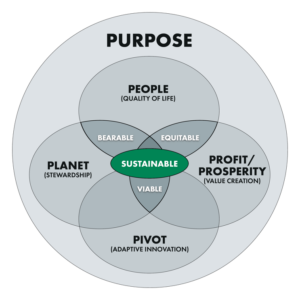Industry 5.0 is here to stay and – given rapid technological evolution – we need to make sure our professionals are ready to take advantage of the changes. I’ve spent the past few years working with industry leaders to develop Industry 5.0-ready employees, working on strategies and best practices for training, leadership development, team building, cross-functional collaboration, and social media use, among many other things.
If you have worked in the same industry for quite a while, you know it is extremely difficult to change your job and environment when neither makes use of industry 5.0 trends (I know – it’s frustrating). But we can be proactive: from a business perspective, as we adopt digital convergence strategies to drive our organisations in a more interconnected and data-driven way, as suggested by Hunsaker and Youngdahl (2018), we also need to understand and embrace three core principles of Industry 5.0 (Breque et al, 2021):
Core Principles of Industry 5.0
(Adapted from Breque et al, 2021)
These principles – technology resilience, human centricity and sustainability – place society firmly at the heart of the purpose of industry, refocusing it on serving society, rather than simply using society to feed the profit machine.
Technology resiliency
Technology resiliency requires creating a culture in the workforce that enables employees to embrace change and adapt to both new technologies and emerging trends. To inculcate and build this resilience in staff, companies must provide learning opportunities for employees and help them develop the skills they need to use these technologies to best advantage.
On a personal note, you – as a professional – can begin to improve your technology resilience by becoming more conscious of how you use and rely on technology at work and in other areas of life. Improving the depth of your personal resilience and matching steps with the business’s technical requirements will make sure that you keep up, and that your infrastructure does not go down or face, for example, a denial of service attack.
Human centricity
From an organisational perspective, embracing human centricity in this era of digitisation and globalisation is a key issue. It may require redefining how your organisation views itself and its purpose, shifting its focus from profit maximisation and creating shareholder value to becoming an enterprise that treats its employees as its prime asset.
Doing the last of these three things does not mean you lose sight of the first two; according to Ung (2021), 80% of CEOs say that putting humans at the centre of decision-making has become a key value driver for their businesses. They clearly understand that people who say they are “living their purpose” at work are four times more likely to report greater engagement levels than those who say they aren’t (McKinsey, 2021).
From a personal perspective, the first thing you need to do to demonstrate the necessity of human centricity in the workforce is to have a “can do” attitude. This means seeing yourself as taking on challenges, not simply doing your own work.
Sustainability
At the same time, the importance of aligning operations and growth to meet sustainability requirements – a key component of the quintuple bottom line – is finally hitting home with businesses, which are realising the implications of water scarcity and climate change.
The Quintuple Bottom Line
(Regenesys Business School, 2019)
Demand for more sustainable services as well as services that improve individual and corporate sustainability will continue to grow. Sustainability must, therefore, be built into every workforce task, process, and goal. The changing dynamics of the economy strongly suggest that organisations need to adopt new strategies to become sustainable – which can only be done with an efficient workforce, not only for sustainable growth, but also for maximum output at the lowest cost.
The importance of sustainability for employees and professionals is no secret. About a quarter of Gen-Z and millennial employees say that a company having a sustainability agenda has influenced them to stay with the organisation (Payesse, 2022).
Note that sustainability requires much more than just labelling your building green or offering decent working conditions. Incorporating sustainability into every practical aspect of your operations offers tangible benefits, including an improved business climate and long-term financial flexibility.
Pursuing sustainable growth and taking full responsibility for your own behaviour. That’s right, I’m talking about inculcating sustainability in the workforce to provide an effective route to move towards the 5Ps of the quintuple bottom line: people, planet, profit, purpose, and the ability to pivot.
Are you ready for Industry 5.0?
- Next: Dr Yadav examines the skills you need to build for Industry 5.0. [Ramesh, please link once the next article exists on the site]
References
Breque, M., De Nul, L., Petridis, A. (2021). Industry 5.0: Towards a sustainable, human-centric and resilient European industry. European Commission, Directorate-General for Research and Innovation, Publications Office.
Hunsaker, B. T., & Youngdahl, W. E. (2018, January 1). Intel: AI and Industry 4.0 Strategy. Thunderbird School of Global Management. Harvard Business Review.
Ung, E. (2019, October 14). Are you building a company that will have the mindset and capabilities to compete in the 21st Century? Forbes Insights.
Smet, A. D., Gagnon, C., & Mygatt, E. (2021, January 11). Organizing for the future: Nine keys to becoming a future-ready company. McKinsey.
Paysse, M. (2022, September 1). 5 reasons sustainability is beneficial for business – not just the environment. Forbes.








